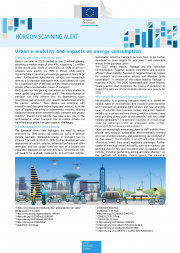
Smart mobility systems and services and transport electrification have the potential to contribute to transport decarbonisation. Policy and innovation efforts have to focus on integrated transport strategies as part of wider smart and sustainable city strategies. They should take into consideration the forthcoming power needs linked to the rise of a new mobility paradigm. The new mobility paradigm is based on new types of vehicles, energy sources, practices and business models that have the potential to improve urban resource efficiency within an integrated transport system. Meanwhile, the decarbonisation of energy supply has to gain momentum through the promotion of renewables-based electricity production, supported by advanced electricity storage systems. In this framework, all implications of the emerging trends have to be considered in the governance and related research and innovation in the field, including emissions and air quality, energy consumption and renewables, accessibility, safety, efficiency and overall quality of life.
| Attachment | Size |
|---|---|
| TRIMIS HS Alert: Urban e-mobility and impacts on energy consumption | 602.72 KB |
